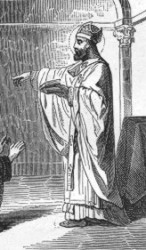Saint Richard, Bishop of Chichester
d. 3 April 1253
 Richard of Wyche was born in 1197 at Droitwyche, the son of a prosperous yeoman
farmer. He and his brother were orphaned at an early age, and an incompetent guardian
wasted the inheritance. Richard worked long and hard to restore the family property,
and when he had succeeded, he turned it over to his brother and went off to Oxford to
become a scholar. When Richard arrived, about 1214, the colleges were still some years
away; the first one, Merton, was not founded until 1262/64. Students enrolled with a
Master, who rented his own Hall for lectures and let out accommodation. Richard was poor
and often cold and hungry. He did very well at his studies, though, and he established
what would be a lifelong friendship with his tutor, Edmund Rich (Edmund of Abingdon).
He studied canon law at Oxford (and probably also at Paris and Bologna) and, having
acquired a doctorate, he became Chancellor of Oxford in 1235.
Richard of Wyche was born in 1197 at Droitwyche, the son of a prosperous yeoman
farmer. He and his brother were orphaned at an early age, and an incompetent guardian
wasted the inheritance. Richard worked long and hard to restore the family property,
and when he had succeeded, he turned it over to his brother and went off to Oxford to
become a scholar. When Richard arrived, about 1214, the colleges were still some years
away; the first one, Merton, was not founded until 1262/64. Students enrolled with a
Master, who rented his own Hall for lectures and let out accommodation. Richard was poor
and often cold and hungry. He did very well at his studies, though, and he established
what would be a lifelong friendship with his tutor, Edmund Rich (Edmund of Abingdon).
He studied canon law at Oxford (and probably also at Paris and Bologna) and, having
acquired a doctorate, he became Chancellor of Oxford in 1235.
Meanwhile, his tutor had become Archbishop of Canterbury, and soon asked Richard to become his Chancellor. When the Archbishop rebuked King Henry III for keeping various bishoprics vacant as long as possible (because as long as they were vacant their revenues went to the Crown), Henry forced him into exile, and Richard accompanied him to France and nursed him in his final illness. After the Archbishop's death in 1240, Richard studied at the Dominican house in Orleans, and was ordained priest in 1243.
In 1244 he was elected Bishop of Chichester, but Henry would not recognize the election, locked him out of the bishop's residence, and pocketed the revenues. Richard accepted shelter with a village priest, and spent the next two years walking barefoot through his diocese, preaching to fishermen and farmers, and correcting abuses. He held synods to legislate, and insisted that the sacraments must be administered without payment, and the Liturgy celebrated with reverence and order. The clergy were required to be celibate, to wear clerical dress, and to live in the parishes they were assigned to and carry out their duties in person. The laity were required to attend services on all Sundays and holy days, and to know by heart the Lord's Prayer, the Hail Mary, and the Apostles' Creed.
At last, in 1247, the King relented and, amid the rejoicing of the people, Richard came to his cathedral at Chichester. Richard's personal life was very simple, but he considered it his duty to keep the state proper to a bishop, and particularly to offer hospitality to rich and poor. Sometimes he was imposed upon, but the people loved him, not only for his almsgiving, but for his caring, preaching and the sweetness of his character. Richard was an able administrator as well as a holy man, and expected high standards from the clergy, although he defended their rights.
Richard was bishop for only eight years. With friends Simon of Tarring, William his Chaplain and Friar Ralph Bocking by the bedside, and surrounded by a crowd of priests, religious and laity, Richard de la Wyche, Bishop of Chichester, died at midnight on 3rd April, 1253.
A well-known prayer written by him reads in part as follows:
Thanks be to thee, my Lord Jesus Christ,
for all the benefits thou hast given me,
for all the pains and insults thou hast borne for me.
O most merciful redeemer, friend and brother,
may I know thee more clearly,
love thee more dearly
and follow thee more nearly, day by day.
Acknowledgements:
Text adapted from James Kiefer's Christian Biographies,
College of Saint Benedict
Image
from Magnificat